Skip to main content
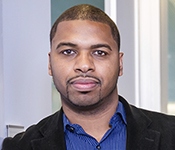 Hakim Weatherspoon (B.S., ‘99) was a rare breed of computer engineering student. As a Husky football player — and one who was named to the Pac-10 All-Academic team, at that — Weatherspoon’s grit and determination on the gridiron was matched by his grit and determination in the classroom. A quarter century after he last took the field for the University of Washington, Weatherspoon scored a College of Engineering Diamond Award from his alma mater for “embracing the power of diversity, equity and inclusion” in his role as Associate Dean for Diversity, Equity and Inclusion in the Cornell Bowers College of Computing and Information Science. Read more →
Hakim Weatherspoon (B.S., ‘99) was a rare breed of computer engineering student. As a Husky football player — and one who was named to the Pac-10 All-Academic team, at that — Weatherspoon’s grit and determination on the gridiron was matched by his grit and determination in the classroom. A quarter century after he last took the field for the University of Washington, Weatherspoon scored a College of Engineering Diamond Award from his alma mater for “embracing the power of diversity, equity and inclusion” in his role as Associate Dean for Diversity, Equity and Inclusion in the Cornell Bowers College of Computing and Information Science. Read more →
June 27, 2024
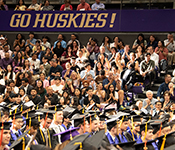 A crowd of roughly 5,000 packed the Hec Edmundson Pavilion at the Alaska Airlines Arena on June 7 to honor the achievements of the Allen School’s 2024 graduating class. Joining the celebration with family and friends was graduation speaker Andy Jassy, President and CEO of Amazon and — for this evening, at least — honorary member of the Dawg Pack. Read more →
A crowd of roughly 5,000 packed the Hec Edmundson Pavilion at the Alaska Airlines Arena on June 7 to honor the achievements of the Allen School’s 2024 graduating class. Joining the celebration with family and friends was graduation speaker Andy Jassy, President and CEO of Amazon and — for this evening, at least — honorary member of the Dawg Pack. Read more →
June 17, 2024
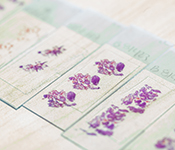 Digital pathology promises to revolutionize medicine by transforming tissue samples into high-resolution images that can be shared and analyzed using powerful new computational tools to assist with clinical decision-making and personalize patient care. But there are challenges to be overcome to achieve this bold new vision for medicine. In a paper published in the journal Nature, researchers at the Allen School, Microsoft Research and Providence unveiled Prov-GigaPath, a groundbreaking open-access foundation model for digital pathology that combines real-world, whole-slide data with individual image tiles at an unprecedented scale. Read more →
Digital pathology promises to revolutionize medicine by transforming tissue samples into high-resolution images that can be shared and analyzed using powerful new computational tools to assist with clinical decision-making and personalize patient care. But there are challenges to be overcome to achieve this bold new vision for medicine. In a paper published in the journal Nature, researchers at the Allen School, Microsoft Research and Providence unveiled Prov-GigaPath, a groundbreaking open-access foundation model for digital pathology that combines real-world, whole-slide data with individual image tiles at an unprecedented scale. Read more →
May 29, 2024
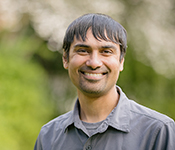 When it comes to the field of human-computer interaction, University of Washington professor Shwetak Patel aims, in his own words, “to think outside the box and challenge existing assumptions.” Patel has repeatedly put that philosophy into practice, inventing entirely new areas of research — and even new industries — in the process. Last week, the Association for Computing Machinery’s Special Interest Group on Computer Human Interaction inducted Patel into the SIGCHI Academy in honor of his trailblazing contributions in health, sustainability and interaction research. Read more →
When it comes to the field of human-computer interaction, University of Washington professor Shwetak Patel aims, in his own words, “to think outside the box and challenge existing assumptions.” Patel has repeatedly put that philosophy into practice, inventing entirely new areas of research — and even new industries — in the process. Last week, the Association for Computing Machinery’s Special Interest Group on Computer Human Interaction inducted Patel into the SIGCHI Academy in honor of his trailblazing contributions in health, sustainability and interaction research. Read more →
May 24, 2024
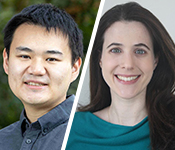 Fascinated by the inner workings of machine learning models for data-driven decision-making, Allen School professor Simon Shaolei Du constructs their theoretical foundations to better understand what makes them tick and then designs algorithms that translate theory into practice. Du’s faculty colleague Adriana Schulz, meanwhile, has clocked how to make the act of making more accessible and sustainable through novel techniques in computer-aided design and manufacturing, drawing upon advances in machine learning, fabrication, programming languages and more. Those efforts received a boost from the Alfred P. Sloan Foundation earlier this year, when Schulz and Du were recognized among the 2024 class of Sloan Research Fellows representing the next generation of scientific leaders. Read more →
Fascinated by the inner workings of machine learning models for data-driven decision-making, Allen School professor Simon Shaolei Du constructs their theoretical foundations to better understand what makes them tick and then designs algorithms that translate theory into practice. Du’s faculty colleague Adriana Schulz, meanwhile, has clocked how to make the act of making more accessible and sustainable through novel techniques in computer-aided design and manufacturing, drawing upon advances in machine learning, fabrication, programming languages and more. Those efforts received a boost from the Alfred P. Sloan Foundation earlier this year, when Schulz and Du were recognized among the 2024 class of Sloan Research Fellows representing the next generation of scientific leaders. Read more →
April 8, 2024
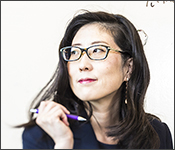 For as long as she can remember, Allen School professor Su-In Lee wanted to be a scientist and professor when she grew up. Her father would sit her down at their home in Korea with a pencil and paper to teach her math — lessons that instilled not just a love of the subject matter but also of teaching. Today, and Lee is putting those lessons to good use in training the next generation of scientists and engineers while advancing explainable AI for biomedical applications. She is also adding up the accolades: After the International Society for Computational Biology recognized Lee with its 2024 ISCB Innovator Award and the American Institute for Medical and Biological Engineering inducted her into the AIMBE College of Fellows, yesterday the Ho-Am Foundation announced Lee as the 2024 Samsung Ho-Am Prize Laureate in Engineering. Read more →
For as long as she can remember, Allen School professor Su-In Lee wanted to be a scientist and professor when she grew up. Her father would sit her down at their home in Korea with a pencil and paper to teach her math — lessons that instilled not just a love of the subject matter but also of teaching. Today, and Lee is putting those lessons to good use in training the next generation of scientists and engineers while advancing explainable AI for biomedical applications. She is also adding up the accolades: After the International Society for Computational Biology recognized Lee with its 2024 ISCB Innovator Award and the American Institute for Medical and Biological Engineering inducted her into the AIMBE College of Fellows, yesterday the Ho-Am Foundation announced Lee as the 2024 Samsung Ho-Am Prize Laureate in Engineering. Read more →
April 3, 2024
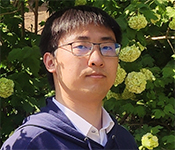 With large language models dominating the discourse, artificial intelligence researchers find themselves increasingly in the limelight. But while LLMs continue to grow in size — and capture a growing share of the public’s imagination — their utility could be limited by their voracious appetite for compute resources and power. This is where researchers like Zihao Ye, a fourth-year Ph.D. student in the Allen School working at the intersection of AI and systems, have an opportunity to shine. NVIDIA recently selected Ye as one of 10 recipients of the company’s highly competitive Graduate Research Fellowship for his work on serving systems for foundation models and sparse computation to improve the efficiency and programmability of emerging architectures like LLMs. Read more →
With large language models dominating the discourse, artificial intelligence researchers find themselves increasingly in the limelight. But while LLMs continue to grow in size — and capture a growing share of the public’s imagination — their utility could be limited by their voracious appetite for compute resources and power. This is where researchers like Zihao Ye, a fourth-year Ph.D. student in the Allen School working at the intersection of AI and systems, have an opportunity to shine. NVIDIA recently selected Ye as one of 10 recipients of the company’s highly competitive Graduate Research Fellowship for his work on serving systems for foundation models and sparse computation to improve the efficiency and programmability of emerging architectures like LLMs. Read more →
February 28, 2024
 Melanoma is one of the most commonly diagnosed cancers in the United States. On the bright side, the five-year survival rate for people with this type of skin cancer is nearly 100% with early detection and treatment. And the prognosis could be even brighter with the emergence of medical-image classifiers powered by artificial intelligence. Researchers in the University of Washington's AIMS Lab led by Allen School professor Su-In Lee and their collaborators at Stanford University developed a technique that combines generative AI and human expertise to understand how such models arrive at their predictions — and where they miss the mark. The team published its findings in the journal Nature Biomedical Engineering. Read more →
Melanoma is one of the most commonly diagnosed cancers in the United States. On the bright side, the five-year survival rate for people with this type of skin cancer is nearly 100% with early detection and treatment. And the prognosis could be even brighter with the emergence of medical-image classifiers powered by artificial intelligence. Researchers in the University of Washington's AIMS Lab led by Allen School professor Su-In Lee and their collaborators at Stanford University developed a technique that combines generative AI and human expertise to understand how such models arrive at their predictions — and where they miss the mark. The team published its findings in the journal Nature Biomedical Engineering. Read more →
February 20, 2024
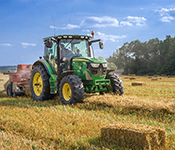 When it comes to the deployment of finite resources, industries are compelled to optimize everything from processes to personnel — and this often requires tradeoffs. But there are some tradeoffs you can’t make, like assigning a quarter of a tractor to a field or half a truck to a route. For problems where the optimal solution makes use of the whole, there is integer programming. And when dealing with a fixed number of variables, for practical reasons many domains rely on heuristics that perform well enough without the formal guarantees of an exact algorithmic solution. After more than 30 years of stalled progress in the field, Allen School Ph.D. student Victor Reis and professor Thomas Rothvoss have produced the first (log n)^{O(n)}-time algorithm for solving integer programming problems within a fixed set of variables. Read more →
When it comes to the deployment of finite resources, industries are compelled to optimize everything from processes to personnel — and this often requires tradeoffs. But there are some tradeoffs you can’t make, like assigning a quarter of a tractor to a field or half a truck to a route. For problems where the optimal solution makes use of the whole, there is integer programming. And when dealing with a fixed number of variables, for practical reasons many domains rely on heuristics that perform well enough without the formal guarantees of an exact algorithmic solution. After more than 30 years of stalled progress in the field, Allen School Ph.D. student Victor Reis and professor Thomas Rothvoss have produced the first (log n)^{O(n)}-time algorithm for solving integer programming problems within a fixed set of variables. Read more →
January 30, 2024
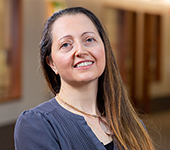 Shortly after Anat Caspi arrived at the University of Washington to lead the Taskar Center for Accessible Technology, she advised a group of students to first place in Seattle’s Hack the Commute competition with a trip planning tool dubbed AccessMap. In the years that followed, she continued to build capacity, both on campus and in the community, for advancing technology designed “for the fullness of human experience” — leading the development of data collection and mapping tools to support urban mobility, project-based courses and summer camps that empower students to apply artificial intelligence and data science to create more inclusive communities, a workshop and toolkit addressing ableism in AI, and more. The Seattle Human Rights Commission recently honored Caspi with its Human Rights Educator Award. Read more →
Shortly after Anat Caspi arrived at the University of Washington to lead the Taskar Center for Accessible Technology, she advised a group of students to first place in Seattle’s Hack the Commute competition with a trip planning tool dubbed AccessMap. In the years that followed, she continued to build capacity, both on campus and in the community, for advancing technology designed “for the fullness of human experience” — leading the development of data collection and mapping tools to support urban mobility, project-based courses and summer camps that empower students to apply artificial intelligence and data science to create more inclusive communities, a workshop and toolkit addressing ableism in AI, and more. The Seattle Human Rights Commission recently honored Caspi with its Human Rights Educator Award. Read more →
January 25, 2024
« Newer Posts — Older Posts »
 Hakim Weatherspoon (B.S., ‘99) was a rare breed of computer engineering student. As a Husky football player — and one who was named to the Pac-10 All-Academic team, at that — Weatherspoon’s grit and determination on the gridiron was matched by his grit and determination in the classroom. A quarter century after he last took the field for the University of Washington, Weatherspoon scored a College of Engineering Diamond Award from his alma mater for “embracing the power of diversity, equity and inclusion” in his role as Associate Dean for Diversity, Equity and Inclusion in the Cornell Bowers College of Computing and Information Science. Read more →
Hakim Weatherspoon (B.S., ‘99) was a rare breed of computer engineering student. As a Husky football player — and one who was named to the Pac-10 All-Academic team, at that — Weatherspoon’s grit and determination on the gridiron was matched by his grit and determination in the classroom. A quarter century after he last took the field for the University of Washington, Weatherspoon scored a College of Engineering Diamond Award from his alma mater for “embracing the power of diversity, equity and inclusion” in his role as Associate Dean for Diversity, Equity and Inclusion in the Cornell Bowers College of Computing and Information Science. Read more →

 Hakim Weatherspoon (B.S., ‘99) was a rare breed of computer engineering student. As a Husky football player — and one who was named to the Pac-10 All-Academic team, at that — Weatherspoon’s grit and determination on the gridiron was matched by his grit and determination in the classroom. A quarter century after he last took the field for the University of Washington, Weatherspoon scored a College of Engineering Diamond Award from his alma mater for “embracing the power of diversity, equity and inclusion” in his role as Associate Dean for Diversity, Equity and Inclusion in the Cornell Bowers College of Computing and Information Science. Read more →
Hakim Weatherspoon (B.S., ‘99) was a rare breed of computer engineering student. As a Husky football player — and one who was named to the Pac-10 All-Academic team, at that — Weatherspoon’s grit and determination on the gridiron was matched by his grit and determination in the classroom. A quarter century after he last took the field for the University of Washington, Weatherspoon scored a College of Engineering Diamond Award from his alma mater for “embracing the power of diversity, equity and inclusion” in his role as Associate Dean for Diversity, Equity and Inclusion in the Cornell Bowers College of Computing and Information Science. Read more →
 A crowd of roughly 5,000 packed the Hec Edmundson Pavilion at the Alaska Airlines Arena on June 7 to honor the achievements of the Allen School’s 2024 graduating class. Joining the celebration with family and friends was graduation speaker Andy Jassy, President and CEO of Amazon and — for this evening, at least — honorary member of the Dawg Pack. Read more →
A crowd of roughly 5,000 packed the Hec Edmundson Pavilion at the Alaska Airlines Arena on June 7 to honor the achievements of the Allen School’s 2024 graduating class. Joining the celebration with family and friends was graduation speaker Andy Jassy, President and CEO of Amazon and — for this evening, at least — honorary member of the Dawg Pack. Read more →
 Digital pathology promises to revolutionize medicine by transforming tissue samples into high-resolution images that can be shared and analyzed using powerful new computational tools to assist with clinical decision-making and personalize patient care. But there are challenges to be overcome to achieve this bold new vision for medicine. In a paper published in the journal Nature, researchers at the Allen School, Microsoft Research and Providence unveiled Prov-GigaPath, a groundbreaking open-access foundation model for digital pathology that combines real-world, whole-slide data with individual image tiles at an unprecedented scale. Read more →
Digital pathology promises to revolutionize medicine by transforming tissue samples into high-resolution images that can be shared and analyzed using powerful new computational tools to assist with clinical decision-making and personalize patient care. But there are challenges to be overcome to achieve this bold new vision for medicine. In a paper published in the journal Nature, researchers at the Allen School, Microsoft Research and Providence unveiled Prov-GigaPath, a groundbreaking open-access foundation model for digital pathology that combines real-world, whole-slide data with individual image tiles at an unprecedented scale. Read more →
 When it comes to the field of human-computer interaction, University of Washington professor Shwetak Patel aims, in his own words, “to think outside the box and challenge existing assumptions.” Patel has repeatedly put that philosophy into practice, inventing entirely new areas of research — and even new industries — in the process. Last week, the Association for Computing Machinery’s Special Interest Group on Computer Human Interaction inducted Patel into the SIGCHI Academy in honor of his trailblazing contributions in health, sustainability and interaction research. Read more →
When it comes to the field of human-computer interaction, University of Washington professor Shwetak Patel aims, in his own words, “to think outside the box and challenge existing assumptions.” Patel has repeatedly put that philosophy into practice, inventing entirely new areas of research — and even new industries — in the process. Last week, the Association for Computing Machinery’s Special Interest Group on Computer Human Interaction inducted Patel into the SIGCHI Academy in honor of his trailblazing contributions in health, sustainability and interaction research. Read more →
 Fascinated by the inner workings of machine learning models for data-driven decision-making, Allen School professor Simon Shaolei Du constructs their theoretical foundations to better understand what makes them tick and then designs algorithms that translate theory into practice. Du’s faculty colleague Adriana Schulz, meanwhile, has clocked how to make the act of making more accessible and sustainable through novel techniques in computer-aided design and manufacturing, drawing upon advances in machine learning, fabrication, programming languages and more. Those efforts received a boost from the Alfred P. Sloan Foundation earlier this year, when Schulz and Du were recognized among the 2024 class of Sloan Research Fellows representing the next generation of scientific leaders. Read more →
Fascinated by the inner workings of machine learning models for data-driven decision-making, Allen School professor Simon Shaolei Du constructs their theoretical foundations to better understand what makes them tick and then designs algorithms that translate theory into practice. Du’s faculty colleague Adriana Schulz, meanwhile, has clocked how to make the act of making more accessible and sustainable through novel techniques in computer-aided design and manufacturing, drawing upon advances in machine learning, fabrication, programming languages and more. Those efforts received a boost from the Alfred P. Sloan Foundation earlier this year, when Schulz and Du were recognized among the 2024 class of Sloan Research Fellows representing the next generation of scientific leaders. Read more →
 For as long as she can remember, Allen School professor Su-In Lee wanted to be a scientist and professor when she grew up. Her father would sit her down at their home in Korea with a pencil and paper to teach her math — lessons that instilled not just a love of the subject matter but also of teaching. Today, and Lee is putting those lessons to good use in training the next generation of scientists and engineers while advancing explainable AI for biomedical applications. She is also adding up the accolades: After the International Society for Computational Biology recognized Lee with its 2024 ISCB Innovator Award and the American Institute for Medical and Biological Engineering inducted her into the AIMBE College of Fellows, yesterday the Ho-Am Foundation announced Lee as the 2024 Samsung Ho-Am Prize Laureate in Engineering. Read more →
For as long as she can remember, Allen School professor Su-In Lee wanted to be a scientist and professor when she grew up. Her father would sit her down at their home in Korea with a pencil and paper to teach her math — lessons that instilled not just a love of the subject matter but also of teaching. Today, and Lee is putting those lessons to good use in training the next generation of scientists and engineers while advancing explainable AI for biomedical applications. She is also adding up the accolades: After the International Society for Computational Biology recognized Lee with its 2024 ISCB Innovator Award and the American Institute for Medical and Biological Engineering inducted her into the AIMBE College of Fellows, yesterday the Ho-Am Foundation announced Lee as the 2024 Samsung Ho-Am Prize Laureate in Engineering. Read more →
 With large language models dominating the discourse, artificial intelligence researchers find themselves increasingly in the limelight. But while LLMs continue to grow in size — and capture a growing share of the public’s imagination — their utility could be limited by their voracious appetite for compute resources and power. This is where researchers like Zihao Ye, a fourth-year Ph.D. student in the Allen School working at the intersection of AI and systems, have an opportunity to shine. NVIDIA recently selected Ye as one of 10 recipients of the company’s highly competitive Graduate Research Fellowship for his work on serving systems for foundation models and sparse computation to improve the efficiency and programmability of emerging architectures like LLMs. Read more →
With large language models dominating the discourse, artificial intelligence researchers find themselves increasingly in the limelight. But while LLMs continue to grow in size — and capture a growing share of the public’s imagination — their utility could be limited by their voracious appetite for compute resources and power. This is where researchers like Zihao Ye, a fourth-year Ph.D. student in the Allen School working at the intersection of AI and systems, have an opportunity to shine. NVIDIA recently selected Ye as one of 10 recipients of the company’s highly competitive Graduate Research Fellowship for his work on serving systems for foundation models and sparse computation to improve the efficiency and programmability of emerging architectures like LLMs. Read more →
 Melanoma is one of the most commonly diagnosed cancers in the United States. On the bright side, the five-year survival rate for people with this type of skin cancer is nearly 100% with early detection and treatment. And the prognosis could be even brighter with the emergence of medical-image classifiers powered by artificial intelligence. Researchers in the University of Washington's AIMS Lab led by Allen School professor Su-In Lee and their collaborators at Stanford University developed a technique that combines generative AI and human expertise to understand how such models arrive at their predictions — and where they miss the mark. The team published its findings in the journal Nature Biomedical Engineering. Read more →
Melanoma is one of the most commonly diagnosed cancers in the United States. On the bright side, the five-year survival rate for people with this type of skin cancer is nearly 100% with early detection and treatment. And the prognosis could be even brighter with the emergence of medical-image classifiers powered by artificial intelligence. Researchers in the University of Washington's AIMS Lab led by Allen School professor Su-In Lee and their collaborators at Stanford University developed a technique that combines generative AI and human expertise to understand how such models arrive at their predictions — and where they miss the mark. The team published its findings in the journal Nature Biomedical Engineering. Read more →
 When it comes to the deployment of finite resources, industries are compelled to optimize everything from processes to personnel — and this often requires tradeoffs. But there are some tradeoffs you can’t make, like assigning a quarter of a tractor to a field or half a truck to a route. For problems where the optimal solution makes use of the whole, there is integer programming. And when dealing with a fixed number of variables, for practical reasons many domains rely on heuristics that perform well enough without the formal guarantees of an exact algorithmic solution. After more than 30 years of stalled progress in the field, Allen School Ph.D. student Victor Reis and professor Thomas Rothvoss have produced the first (log n)^{O(n)}-time algorithm for solving integer programming problems within a fixed set of variables. Read more →
When it comes to the deployment of finite resources, industries are compelled to optimize everything from processes to personnel — and this often requires tradeoffs. But there are some tradeoffs you can’t make, like assigning a quarter of a tractor to a field or half a truck to a route. For problems where the optimal solution makes use of the whole, there is integer programming. And when dealing with a fixed number of variables, for practical reasons many domains rely on heuristics that perform well enough without the formal guarantees of an exact algorithmic solution. After more than 30 years of stalled progress in the field, Allen School Ph.D. student Victor Reis and professor Thomas Rothvoss have produced the first (log n)^{O(n)}-time algorithm for solving integer programming problems within a fixed set of variables. Read more →
 Shortly after Anat Caspi arrived at the University of Washington to lead the Taskar Center for Accessible Technology, she advised a group of students to first place in Seattle’s Hack the Commute competition with a trip planning tool dubbed AccessMap. In the years that followed, she continued to build capacity, both on campus and in the community, for advancing technology designed “for the fullness of human experience” — leading the development of data collection and mapping tools to support urban mobility, project-based courses and summer camps that empower students to apply artificial intelligence and data science to create more inclusive communities, a workshop and toolkit addressing ableism in AI, and more. The Seattle Human Rights Commission recently honored Caspi with its Human Rights Educator Award. Read more →
Shortly after Anat Caspi arrived at the University of Washington to lead the Taskar Center for Accessible Technology, she advised a group of students to first place in Seattle’s Hack the Commute competition with a trip planning tool dubbed AccessMap. In the years that followed, she continued to build capacity, both on campus and in the community, for advancing technology designed “for the fullness of human experience” — leading the development of data collection and mapping tools to support urban mobility, project-based courses and summer camps that empower students to apply artificial intelligence and data science to create more inclusive communities, a workshop and toolkit addressing ableism in AI, and more. The Seattle Human Rights Commission recently honored Caspi with its Human Rights Educator Award. Read more →
